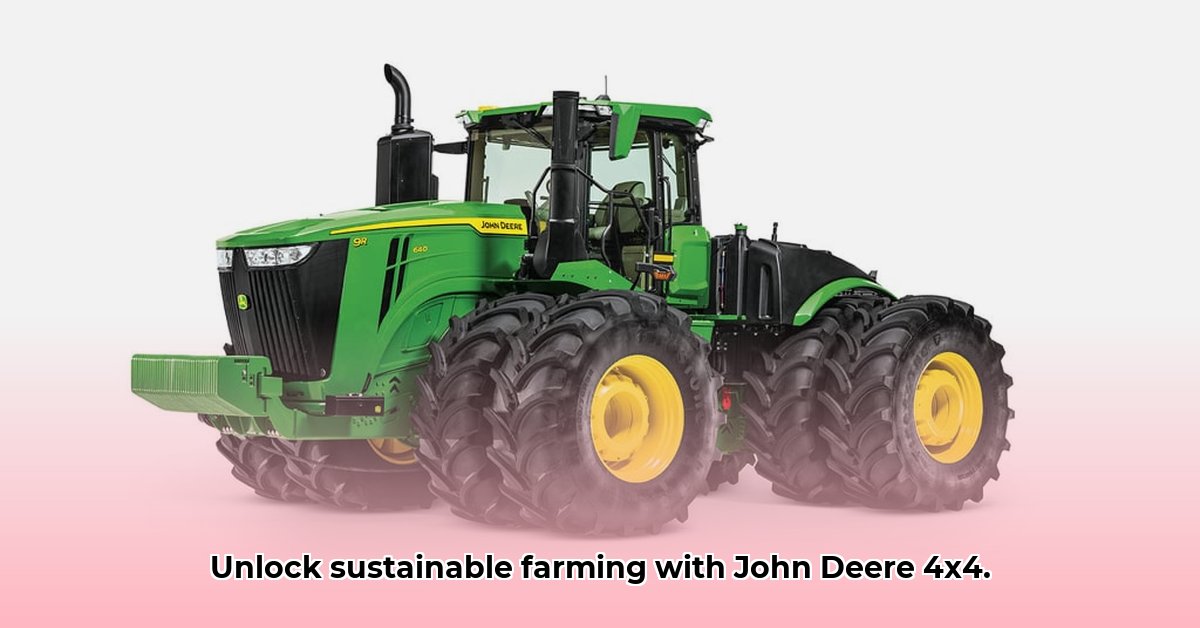
Choosing the Right John Deere 4x4 for Sustainable Practices
Choosing a tractor is a significant investment impacting both farm profitability and environmental sustainability. John Deere's 4x4 range offers various models, each suited to different farming needs and sustainability goals. This guide helps navigate these choices by considering factors beyond horsepower, focusing on fuel efficiency and soil health. How can you minimize your environmental impact while maximizing yields? Let's explore this critical question.
For tractor maintenance information, check out this helpful resource: John Deere Starters.
The weight and size of a tractor directly influence soil compaction. Larger, high-horsepower models, while efficient for vast fields, risk compacting soil, reducing aeration and hindering root growth. This compaction can decrease water infiltration and ultimately lower crop yields over time. How can you mitigate this trade-off between efficiency and soil health? A data-driven approach is key.
Smaller, more agile John Deere 4x4 models offer enhanced maneuverability, making them ideal for smaller farms, specialized tasks, and situations where preserving soil structure is vital. These tractors often allow for precision agriculture techniques, minimizing resource waste and environmental impact. But are they suitable for every operation? The answer depends on your specific farm size and crop types.
Sustainable Farming: Beyond Fuel Efficiency
Sustainable farming encompasses resource management, including minimizing soil compaction, optimizing fertilizer and pesticide application, and maximizing fuel efficiency. It's about creating a balanced system that supports both your farm's economic viability and the health of the environment. What are the key strategies for integrating sustainability into your operations?
Lowering soil compaction is paramount. Techniques such as utilizing wider tires or specialized low-ground-pressure tires significantly reduce ground pressure, resulting in healthier soil and better crop yields. How much reduction can we expect? Studies have shown a significant positive impact on soil health in similar situations.
Precision agriculture, using GPS-guided tractors and variable rate technology, is another key component. This allows precise application of inputs, ensuring optimal nutrient use, minimal chemical waste, and decreased environmental impact. With many John Deere 4x4 tractors compatible with these technologies, the path to sustainable farming is readily available. What are the economic benefits alongside the environmental ones? Precision agriculture reduces input costs while optimizing output.
Fuel efficiency is also vital. Choosing a fuel-efficient model translates directly into lower greenhouse gas emissions and reduced operating costs. Careful analysis of fuel consumption data for different models is crucial in making an informed decision. How significant are these savings over the lifetime of the tractor? The long-term benefits can be substantial.
Choosing Your John Deere 4x4: A Practical Framework
To assist in your decision-making process, consider the following:
| Farm Size | Soil Type | Typical Crops | Recommended John Deere 4x4 Tractor Type | Primary Considerations |
|---|---|---|---|---|
| Small (under 50 acres) | Light, well-drained | Vegetables, fruits, specialty crops | Compact Utility Tractors | Maneuverability, fuel efficiency, and ease of operation. |
| Medium (50-200 acres) | Mixed | Diverse crops | Mid-range tractors with advanced features | Balance between power, precision agriculture capabilities, and soil conservation. |
| Large (over 200 acres) | Heavy, clay-based | Grains, row crops | High-horsepower tractors with advanced features | Efficiency, potential for large tires to reduce compaction, and ease of handling large fields. |
A Farmer's Long-Term Perspective: More Than Just the Purchase Price
The initial purchase price is only one element of the overall cost. Consider fuel efficiency, maintenance costs, and the long-term impact on soil health and yield potential. A model with higher initial cost yet better fuel economy and reduced maintenance can prove more economical over its lifespan. What are the long-term financial implications of choosing sustainable practices? Ultimately, you are investing in the health and future productivity of your land.
Steps to Sustainable Farming with Your John Deere 4x4 Tractor
Assess Your Farm: Analyze soil type, farm size, typical crops grown, and long-term farming goals.
Research Tractor Models: Carefully review John Deere 4x4 tractor specifications, focusing on fuel efficiency, precision agriculture capabilities, and soil compaction-reducing features.
Consult Experts: Seek guidance from agricultural advisors, extension agents, and experienced farmers to leverage local expertise.
Calculate Life-Cycle Costs: Estimate total costs, including purchase price, fuel, maintenance, and potential environmental impacts.
Implement Soil Conservation: Employ best practices, including no-till farming and cover cropping, to improve soil health and minimize compaction.
Sustainable farming is an ongoing commitment. The right John Deere 4x4 tractor, coupled with responsible practices, is a key step towards a profitable and environmentally conscious farming operation.